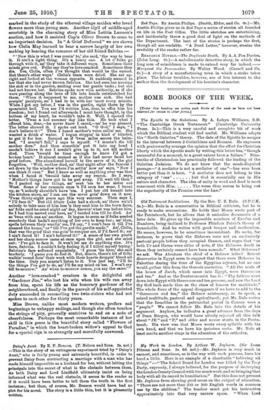Old Testament Institutions. By the Rev. U. Z. Rule. (S.P.C.K.
5s.)—Mr. Rule is a conservative in Biblical criticism, but ho is ready to make concessions. He holds that Moses wrote part of the Pentateuch, but ho allows that it embodies documents of a later date. He gives up the impossible numbers of Exodus and Numbers, being inclined to Professor Flinders Petrie's theory of households. And he writes with good temper and moderation. He seems, however, to be sometimes inconsistent. He seeks, for instance, to prove that the Hebrews were not an exclesively pastoral people before they occupied Canaan, and urges that "as both '[Jr and Miran were cities of note, if the Hebrews dwelt in them they certainly cannot have been nomads." What Hebrews P we ask. Was Abraham the chief of a Hebrew tribe 1 Recent discoveries in Egypt seem to suggest that there were Hebrews in Palestine during the time of the Egyptian sojourn, but no one would gather this from the Genesis narrative. " All the souls of the house of Jacob, which came into Egypt, were thrcesccro and ten." And so the Deuteronomist has it : " Thy fathers went down into Egypt with threescore and ten persons; and now the Lord thy God bath made thee as the stars of heaven for multitude." The whole force of the appeal disappears if we have to add to the "threescore and ten," the Hebrew aristocracy, so to speak, a mixed multitude, pastoral and agricultural ; yet Mr. Rule writes that the Israelites in the patriarchal period in Canaan were a "people." We cannot follow Mr. Rule into the details of his argument. Anyhow, he indicates a great advance from the days of Dean Burgon, who would have utterly rejected all this talk about " JE " and "P," and older and newer strata in the Pentee tench. His view was that Moses wrote every syllable with his own hand, and that we have his ipsissima verba. Mr. Rule at least marks another stage in the education of the orthodox.






















































 Previous page
Previous page